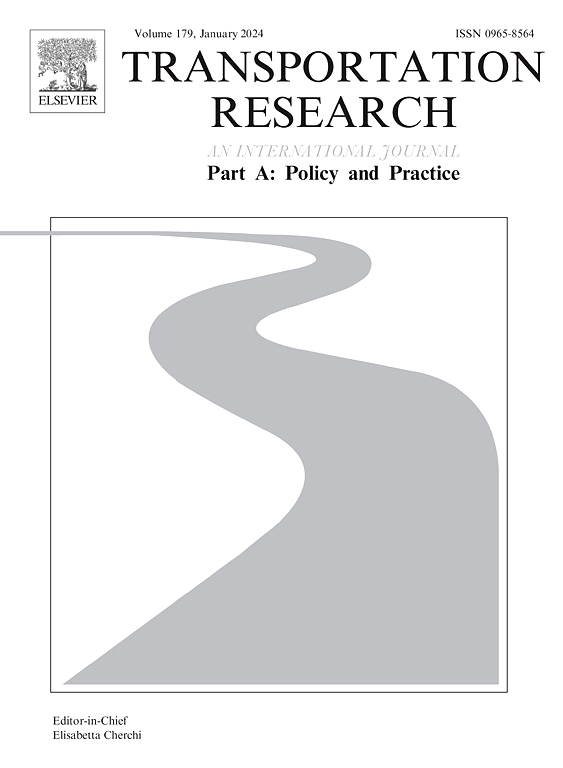Psychological mechanisms of commuting: A cognitive dissonance approach to intercontinental commuting discomfort in Istanbul
IF 6.3
1区 工程技术
Q1 ECONOMICS
Transportation Research Part A-Policy and Practice
Pub Date : 2025-03-22
DOI:10.1016/j.tra.2025.104448
引用次数: 0
Abstract
This study explores the psychological mechanisms relevant for reducing commute dissonance, i.e., the psychological discomfort due to an inconsistency between commute-related cognitions and behaviour, based on Cognitive Dissonance Theory. The study is contextualised in Istanbul, where many professionals commute between Europe and Asia for work almost daily and experience its negative effects on well-being. Sudden change to such intercontinental commuting due to lockdown restrictions during the COVID-19 pandemic provided a nuanced exploration of commuter attitudes and behaviour. Semi-structed interviews were conducted before (N = 40) and after the pandemic (N = 15). Interviews explored participants’ commuting perceptions, experience, attitudes and motivations. Findings show that effort justification (commuting as trade-off for living in Istanbul and/or in the preferred neighbourhood and as effective time use) is the primary psychological mechanism commuters use for rationalising the intercontinental commute. Our results confirm empirical research on residential location, family relations and career opportunities. This exploration contributes to urban scholarship by highlighting the relevance of intrinsic needs (i.e., place attachment) associated with urban characteristics of the city and the neighbourhood, and demonstrating the intersection of urban characteristics and psychological mechanisms in explaining commuting cognition and behaviour. From a policy and practice perspective, our findings suggest that urban planning strategies should also focus on improving the commuting experience, even if transportation infrastructure cannot be changed in the short term.
求助全文
约1分钟内获得全文
求助全文
来源期刊
CiteScore
13.20
自引率
7.80%
发文量
257
审稿时长
9.8 months
期刊介绍:
Transportation Research: Part A contains papers of general interest in all passenger and freight transportation modes: policy analysis, formulation and evaluation; planning; interaction with the political, socioeconomic and physical environment; design, management and evaluation of transportation systems. Topics are approached from any discipline or perspective: economics, engineering, sociology, psychology, etc. Case studies, survey and expository papers are included, as are articles which contribute to unification of the field, or to an understanding of the comparative aspects of different systems. Papers which assess the scope for technological innovation within a social or political framework are also published. The journal is international, and places equal emphasis on the problems of industrialized and non-industrialized regions.
Part A''s aims and scope are complementary to Transportation Research Part B: Methodological, Part C: Emerging Technologies and Part D: Transport and Environment. Part E: Logistics and Transportation Review. Part F: Traffic Psychology and Behaviour. The complete set forms the most cohesive and comprehensive reference of current research in transportation science.

 求助内容:
求助内容: 应助结果提醒方式:
应助结果提醒方式:


